Analysis of Business Ethics and Corporate Social Responsibility
VerifiedAdded on 2021/02/19
|8
|2614
|86
Essay
AI Summary
This essay analyzes the intricate relationship between business ethics, inheritance, and capitalism, examining the fundamental ideals of capitalism such as distribution based on productivity, equal opportunity, and freedom. It delves into Haslett's arguments on abolishing inheritance, assessing whether it would break capitalism's commitment to freedom and enhance individual liberties. The essay explores various perspectives, including libertarian, Rawlsian, and utilitarian viewpoints, to evaluate the implications of inheritance. It also discusses the potential impact of abolishing inheritance on moral rights and the fairness of different tax systems. The essay concludes by summarizing the key arguments and offering insights into the complexities of wealth distribution and its ethical considerations. This assignment, available on Desklib, provides a comprehensive analysis of the topic.

Business ethics and
corporate social
responsibility
corporate social
responsibility
Paraphrase This Document
Need a fresh take? Get an instant paraphrase of this document with our AI Paraphraser
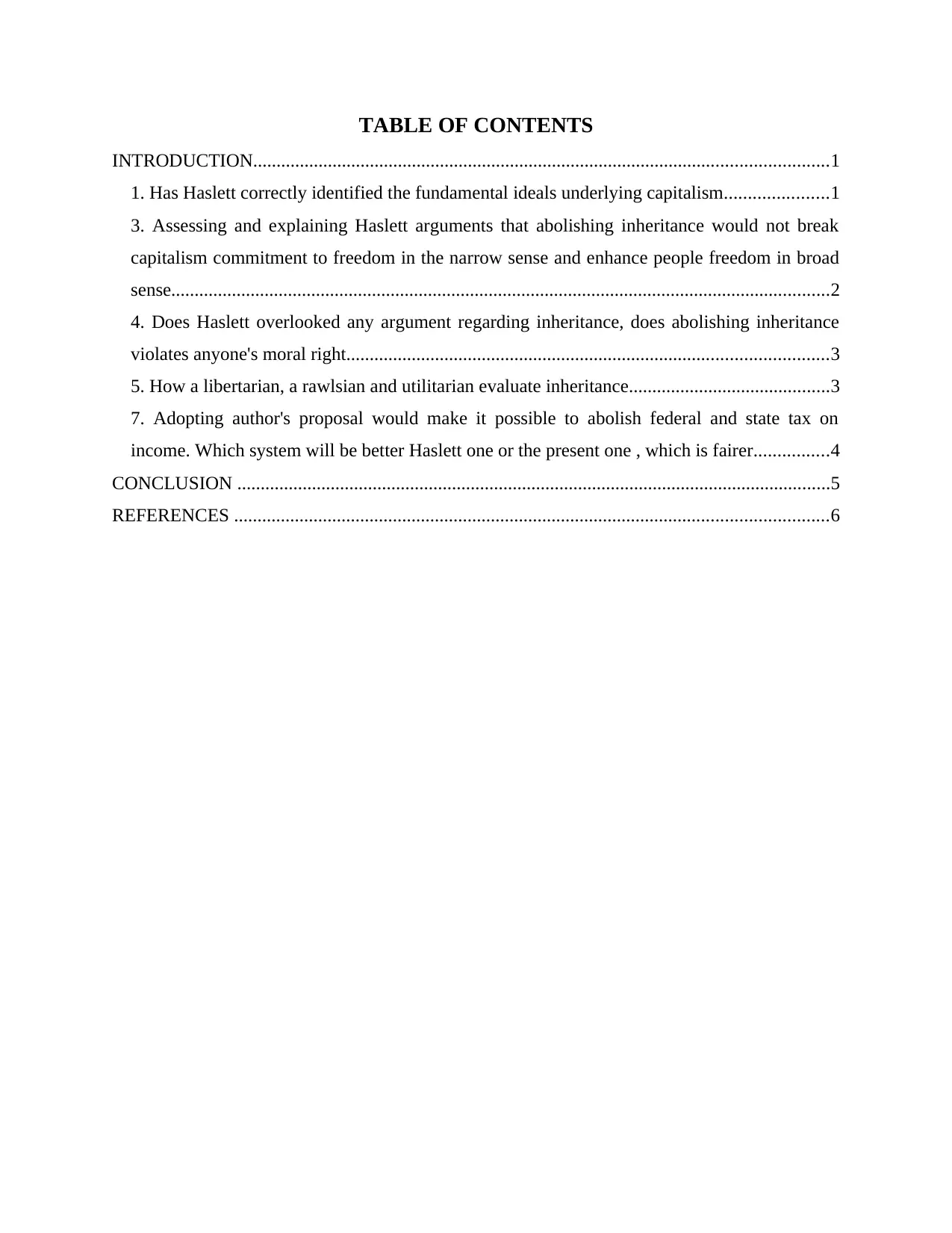
TABLE OF CONTENTS
INTRODUCTION...........................................................................................................................1
1. Has Haslett correctly identified the fundamental ideals underlying capitalism......................1
3. Assessing and explaining Haslett arguments that abolishing inheritance would not break
capitalism commitment to freedom in the narrow sense and enhance people freedom in broad
sense.............................................................................................................................................2
4. Does Haslett overlooked any argument regarding inheritance, does abolishing inheritance
violates anyone's moral right.......................................................................................................3
5. How a libertarian, a rawlsian and utilitarian evaluate inheritance...........................................3
7. Adopting author's proposal would make it possible to abolish federal and state tax on
income. Which system will be better Haslett one or the present one , which is fairer................4
CONCLUSION ...............................................................................................................................5
REFERENCES ...............................................................................................................................6
INTRODUCTION...........................................................................................................................1
1. Has Haslett correctly identified the fundamental ideals underlying capitalism......................1
3. Assessing and explaining Haslett arguments that abolishing inheritance would not break
capitalism commitment to freedom in the narrow sense and enhance people freedom in broad
sense.............................................................................................................................................2
4. Does Haslett overlooked any argument regarding inheritance, does abolishing inheritance
violates anyone's moral right.......................................................................................................3
5. How a libertarian, a rawlsian and utilitarian evaluate inheritance...........................................3
7. Adopting author's proposal would make it possible to abolish federal and state tax on
income. Which system will be better Haslett one or the present one , which is fairer................4
CONCLUSION ...............................................................................................................................5
REFERENCES ...............................................................................................................................6
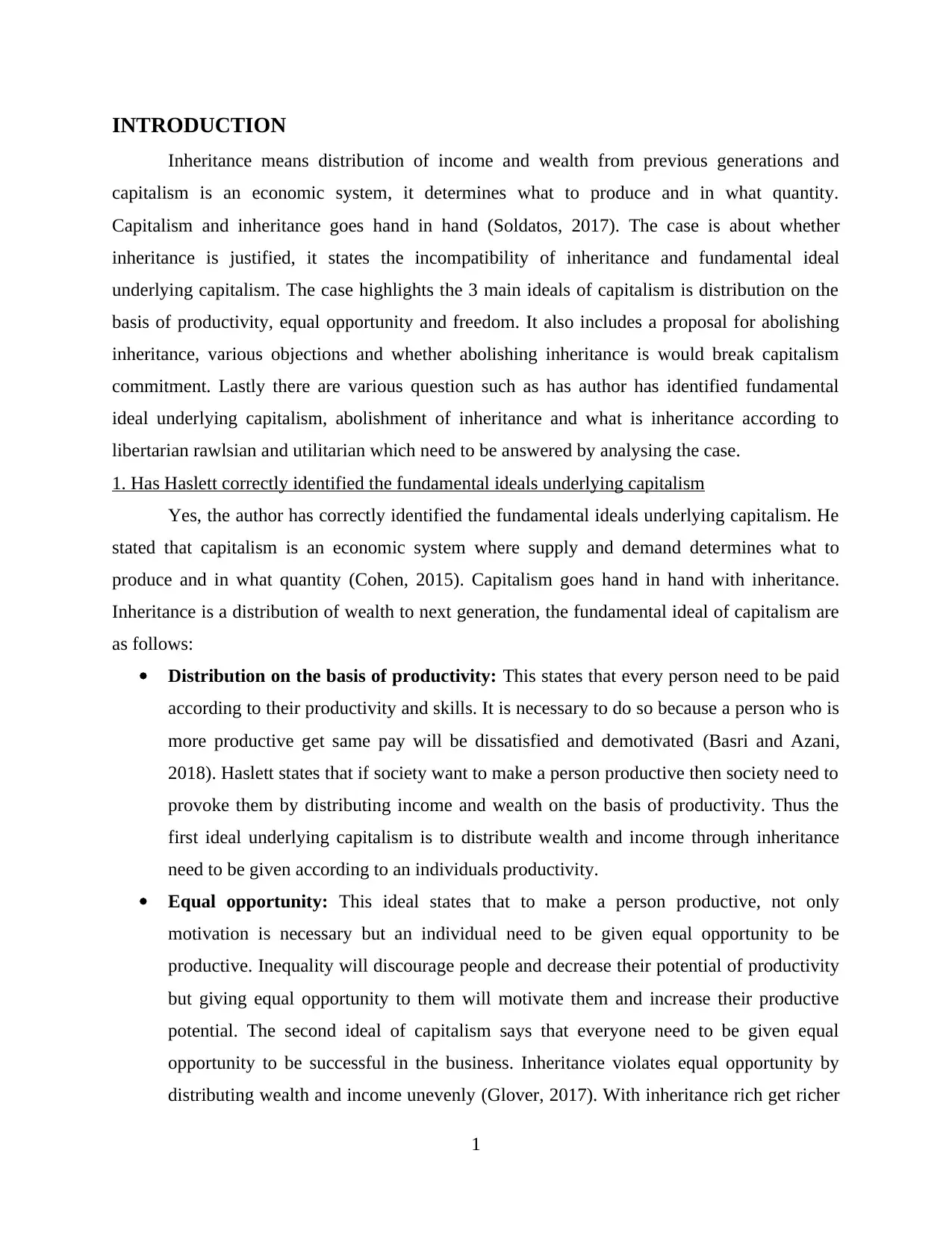
INTRODUCTION
Inheritance means distribution of income and wealth from previous generations and
capitalism is an economic system, it determines what to produce and in what quantity.
Capitalism and inheritance goes hand in hand (Soldatos, 2017). The case is about whether
inheritance is justified, it states the incompatibility of inheritance and fundamental ideal
underlying capitalism. The case highlights the 3 main ideals of capitalism is distribution on the
basis of productivity, equal opportunity and freedom. It also includes a proposal for abolishing
inheritance, various objections and whether abolishing inheritance is would break capitalism
commitment. Lastly there are various question such as has author has identified fundamental
ideal underlying capitalism, abolishment of inheritance and what is inheritance according to
libertarian rawlsian and utilitarian which need to be answered by analysing the case.
1. Has Haslett correctly identified the fundamental ideals underlying capitalism
Yes, the author has correctly identified the fundamental ideals underlying capitalism. He
stated that capitalism is an economic system where supply and demand determines what to
produce and in what quantity (Cohen, 2015). Capitalism goes hand in hand with inheritance.
Inheritance is a distribution of wealth to next generation, the fundamental ideal of capitalism are
as follows:
Distribution on the basis of productivity: This states that every person need to be paid
according to their productivity and skills. It is necessary to do so because a person who is
more productive get same pay will be dissatisfied and demotivated (Basri and Azani,
2018). Haslett states that if society want to make a person productive then society need to
provoke them by distributing income and wealth on the basis of productivity. Thus the
first ideal underlying capitalism is to distribute wealth and income through inheritance
need to be given according to an individuals productivity.
Equal opportunity: This ideal states that to make a person productive, not only
motivation is necessary but an individual need to be given equal opportunity to be
productive. Inequality will discourage people and decrease their potential of productivity
but giving equal opportunity to them will motivate them and increase their productive
potential. The second ideal of capitalism says that everyone need to be given equal
opportunity to be successful in the business. Inheritance violates equal opportunity by
distributing wealth and income unevenly (Glover, 2017). With inheritance rich get richer
1
Inheritance means distribution of income and wealth from previous generations and
capitalism is an economic system, it determines what to produce and in what quantity.
Capitalism and inheritance goes hand in hand (Soldatos, 2017). The case is about whether
inheritance is justified, it states the incompatibility of inheritance and fundamental ideal
underlying capitalism. The case highlights the 3 main ideals of capitalism is distribution on the
basis of productivity, equal opportunity and freedom. It also includes a proposal for abolishing
inheritance, various objections and whether abolishing inheritance is would break capitalism
commitment. Lastly there are various question such as has author has identified fundamental
ideal underlying capitalism, abolishment of inheritance and what is inheritance according to
libertarian rawlsian and utilitarian which need to be answered by analysing the case.
1. Has Haslett correctly identified the fundamental ideals underlying capitalism
Yes, the author has correctly identified the fundamental ideals underlying capitalism. He
stated that capitalism is an economic system where supply and demand determines what to
produce and in what quantity (Cohen, 2015). Capitalism goes hand in hand with inheritance.
Inheritance is a distribution of wealth to next generation, the fundamental ideal of capitalism are
as follows:
Distribution on the basis of productivity: This states that every person need to be paid
according to their productivity and skills. It is necessary to do so because a person who is
more productive get same pay will be dissatisfied and demotivated (Basri and Azani,
2018). Haslett states that if society want to make a person productive then society need to
provoke them by distributing income and wealth on the basis of productivity. Thus the
first ideal underlying capitalism is to distribute wealth and income through inheritance
need to be given according to an individuals productivity.
Equal opportunity: This ideal states that to make a person productive, not only
motivation is necessary but an individual need to be given equal opportunity to be
productive. Inequality will discourage people and decrease their potential of productivity
but giving equal opportunity to them will motivate them and increase their productive
potential. The second ideal of capitalism says that everyone need to be given equal
opportunity to be successful in the business. Inheritance violates equal opportunity by
distributing wealth and income unevenly (Glover, 2017). With inheritance rich get richer
1
⊘ This is a preview!⊘
Do you want full access?
Subscribe today to unlock all pages.

Trusted by 1+ million students worldwide
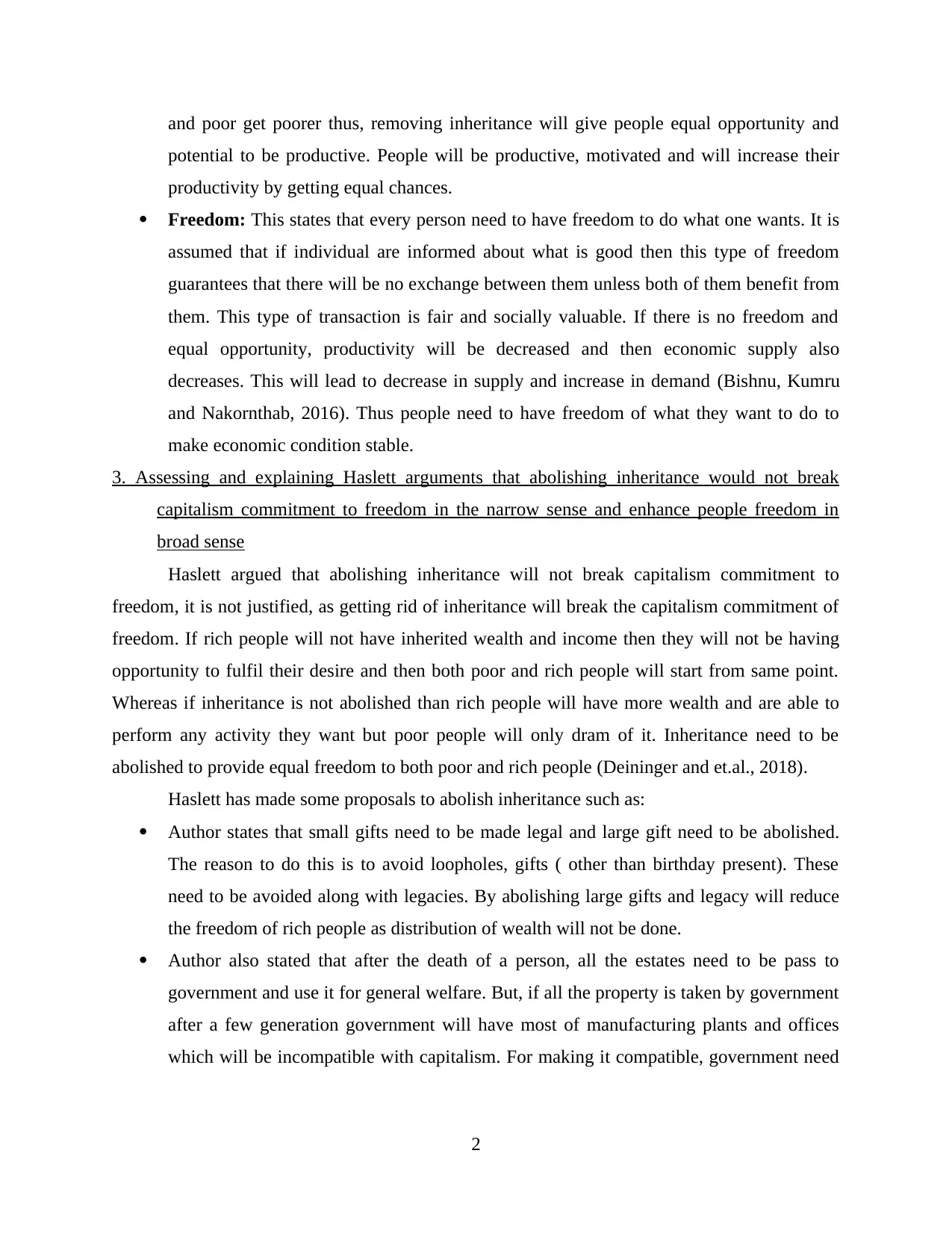
and poor get poorer thus, removing inheritance will give people equal opportunity and
potential to be productive. People will be productive, motivated and will increase their
productivity by getting equal chances.
Freedom: This states that every person need to have freedom to do what one wants. It is
assumed that if individual are informed about what is good then this type of freedom
guarantees that there will be no exchange between them unless both of them benefit from
them. This type of transaction is fair and socially valuable. If there is no freedom and
equal opportunity, productivity will be decreased and then economic supply also
decreases. This will lead to decrease in supply and increase in demand (Bishnu, Kumru
and Nakornthab, 2016). Thus people need to have freedom of what they want to do to
make economic condition stable.
3. Assessing and explaining Haslett arguments that abolishing inheritance would not break
capitalism commitment to freedom in the narrow sense and enhance people freedom in
broad sense
Haslett argued that abolishing inheritance will not break capitalism commitment to
freedom, it is not justified, as getting rid of inheritance will break the capitalism commitment of
freedom. If rich people will not have inherited wealth and income then they will not be having
opportunity to fulfil their desire and then both poor and rich people will start from same point.
Whereas if inheritance is not abolished than rich people will have more wealth and are able to
perform any activity they want but poor people will only dram of it. Inheritance need to be
abolished to provide equal freedom to both poor and rich people (Deininger and et.al., 2018).
Haslett has made some proposals to abolish inheritance such as:
Author states that small gifts need to be made legal and large gift need to be abolished.
The reason to do this is to avoid loopholes, gifts ( other than birthday present). These
need to be avoided along with legacies. By abolishing large gifts and legacy will reduce
the freedom of rich people as distribution of wealth will not be done.
Author also stated that after the death of a person, all the estates need to be pass to
government and use it for general welfare. But, if all the property is taken by government
after a few generation government will have most of manufacturing plants and offices
which will be incompatible with capitalism. For making it compatible, government need
2
potential to be productive. People will be productive, motivated and will increase their
productivity by getting equal chances.
Freedom: This states that every person need to have freedom to do what one wants. It is
assumed that if individual are informed about what is good then this type of freedom
guarantees that there will be no exchange between them unless both of them benefit from
them. This type of transaction is fair and socially valuable. If there is no freedom and
equal opportunity, productivity will be decreased and then economic supply also
decreases. This will lead to decrease in supply and increase in demand (Bishnu, Kumru
and Nakornthab, 2016). Thus people need to have freedom of what they want to do to
make economic condition stable.
3. Assessing and explaining Haslett arguments that abolishing inheritance would not break
capitalism commitment to freedom in the narrow sense and enhance people freedom in
broad sense
Haslett argued that abolishing inheritance will not break capitalism commitment to
freedom, it is not justified, as getting rid of inheritance will break the capitalism commitment of
freedom. If rich people will not have inherited wealth and income then they will not be having
opportunity to fulfil their desire and then both poor and rich people will start from same point.
Whereas if inheritance is not abolished than rich people will have more wealth and are able to
perform any activity they want but poor people will only dram of it. Inheritance need to be
abolished to provide equal freedom to both poor and rich people (Deininger and et.al., 2018).
Haslett has made some proposals to abolish inheritance such as:
Author states that small gifts need to be made legal and large gift need to be abolished.
The reason to do this is to avoid loopholes, gifts ( other than birthday present). These
need to be avoided along with legacies. By abolishing large gifts and legacy will reduce
the freedom of rich people as distribution of wealth will not be done.
Author also stated that after the death of a person, all the estates need to be pass to
government and use it for general welfare. But, if all the property is taken by government
after a few generation government will have most of manufacturing plants and offices
which will be incompatible with capitalism. For making it compatible, government need
2
Paraphrase This Document
Need a fresh take? Get an instant paraphrase of this document with our AI Paraphraser
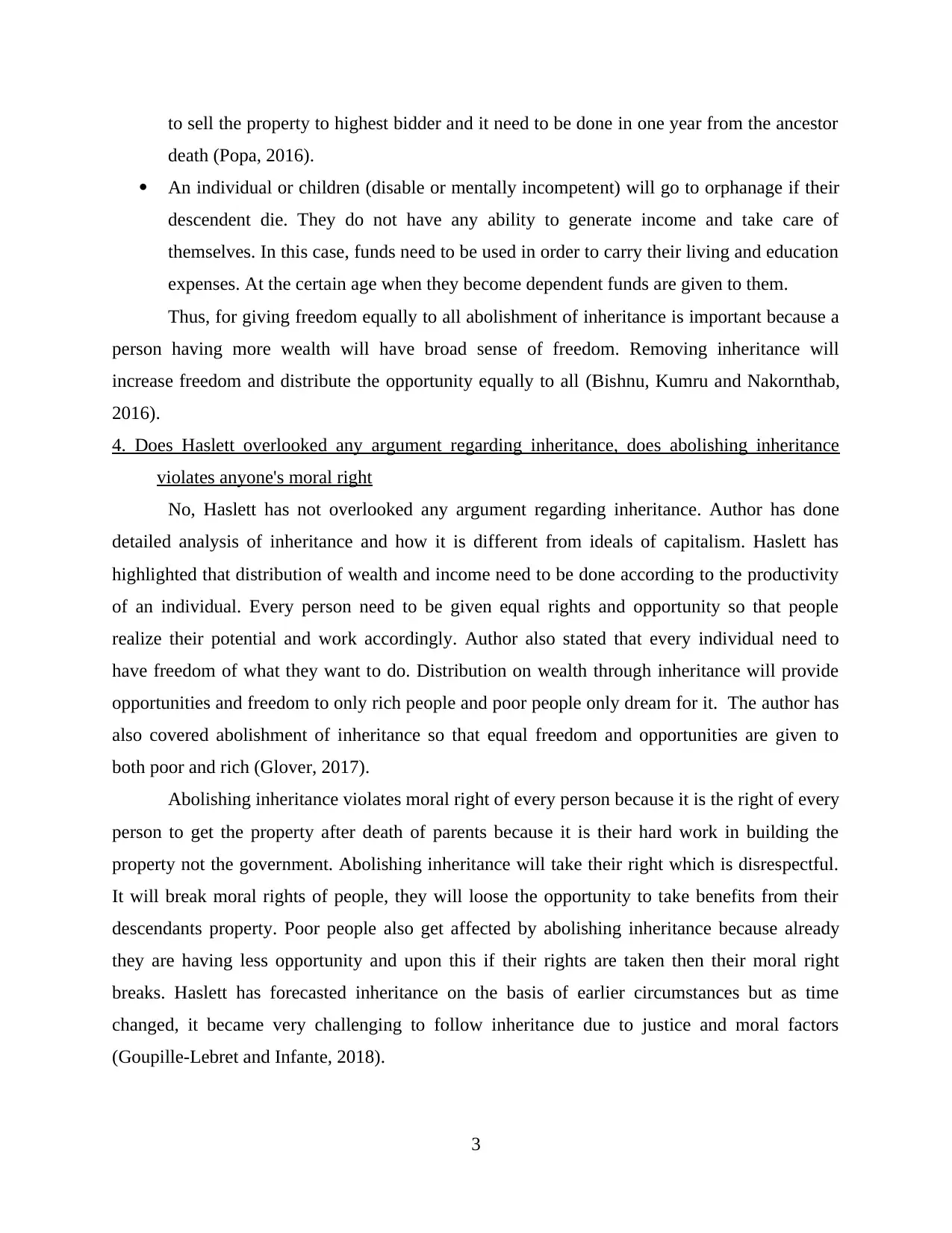
to sell the property to highest bidder and it need to be done in one year from the ancestor
death (Popa, 2016).
An individual or children (disable or mentally incompetent) will go to orphanage if their
descendent die. They do not have any ability to generate income and take care of
themselves. In this case, funds need to be used in order to carry their living and education
expenses. At the certain age when they become dependent funds are given to them.
Thus, for giving freedom equally to all abolishment of inheritance is important because a
person having more wealth will have broad sense of freedom. Removing inheritance will
increase freedom and distribute the opportunity equally to all (Bishnu, Kumru and Nakornthab,
2016).
4. Does Haslett overlooked any argument regarding inheritance, does abolishing inheritance
violates anyone's moral right
No, Haslett has not overlooked any argument regarding inheritance. Author has done
detailed analysis of inheritance and how it is different from ideals of capitalism. Haslett has
highlighted that distribution of wealth and income need to be done according to the productivity
of an individual. Every person need to be given equal rights and opportunity so that people
realize their potential and work accordingly. Author also stated that every individual need to
have freedom of what they want to do. Distribution on wealth through inheritance will provide
opportunities and freedom to only rich people and poor people only dream for it. The author has
also covered abolishment of inheritance so that equal freedom and opportunities are given to
both poor and rich (Glover, 2017).
Abolishing inheritance violates moral right of every person because it is the right of every
person to get the property after death of parents because it is their hard work in building the
property not the government. Abolishing inheritance will take their right which is disrespectful.
It will break moral rights of people, they will loose the opportunity to take benefits from their
descendants property. Poor people also get affected by abolishing inheritance because already
they are having less opportunity and upon this if their rights are taken then their moral right
breaks. Haslett has forecasted inheritance on the basis of earlier circumstances but as time
changed, it became very challenging to follow inheritance due to justice and moral factors
(Goupille-Lebret and Infante, 2018).
3
death (Popa, 2016).
An individual or children (disable or mentally incompetent) will go to orphanage if their
descendent die. They do not have any ability to generate income and take care of
themselves. In this case, funds need to be used in order to carry their living and education
expenses. At the certain age when they become dependent funds are given to them.
Thus, for giving freedom equally to all abolishment of inheritance is important because a
person having more wealth will have broad sense of freedom. Removing inheritance will
increase freedom and distribute the opportunity equally to all (Bishnu, Kumru and Nakornthab,
2016).
4. Does Haslett overlooked any argument regarding inheritance, does abolishing inheritance
violates anyone's moral right
No, Haslett has not overlooked any argument regarding inheritance. Author has done
detailed analysis of inheritance and how it is different from ideals of capitalism. Haslett has
highlighted that distribution of wealth and income need to be done according to the productivity
of an individual. Every person need to be given equal rights and opportunity so that people
realize their potential and work accordingly. Author also stated that every individual need to
have freedom of what they want to do. Distribution on wealth through inheritance will provide
opportunities and freedom to only rich people and poor people only dream for it. The author has
also covered abolishment of inheritance so that equal freedom and opportunities are given to
both poor and rich (Glover, 2017).
Abolishing inheritance violates moral right of every person because it is the right of every
person to get the property after death of parents because it is their hard work in building the
property not the government. Abolishing inheritance will take their right which is disrespectful.
It will break moral rights of people, they will loose the opportunity to take benefits from their
descendants property. Poor people also get affected by abolishing inheritance because already
they are having less opportunity and upon this if their rights are taken then their moral right
breaks. Haslett has forecasted inheritance on the basis of earlier circumstances but as time
changed, it became very challenging to follow inheritance due to justice and moral factors
(Goupille-Lebret and Infante, 2018).
3
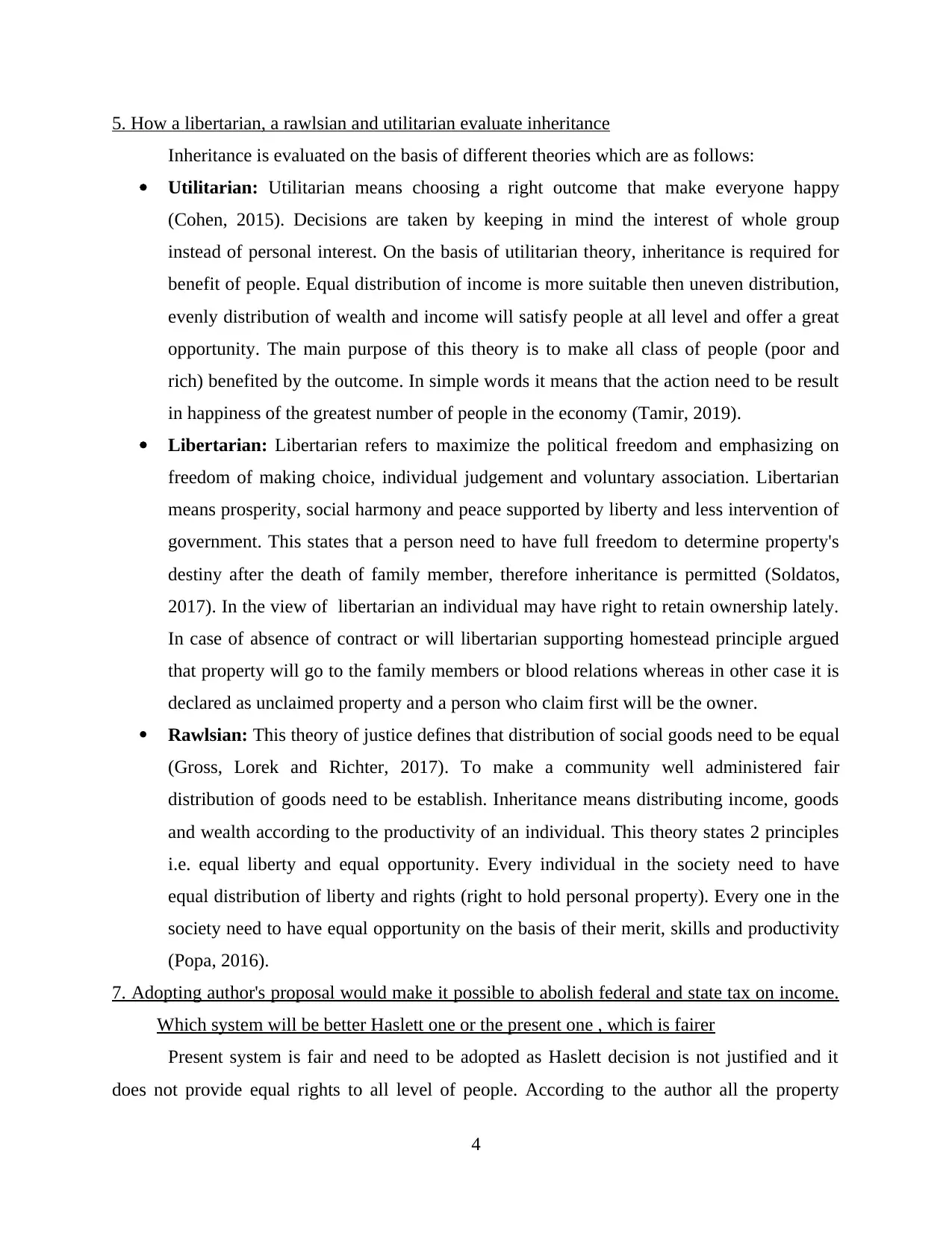
5. How a libertarian, a rawlsian and utilitarian evaluate inheritance
Inheritance is evaluated on the basis of different theories which are as follows:
Utilitarian: Utilitarian means choosing a right outcome that make everyone happy
(Cohen, 2015). Decisions are taken by keeping in mind the interest of whole group
instead of personal interest. On the basis of utilitarian theory, inheritance is required for
benefit of people. Equal distribution of income is more suitable then uneven distribution,
evenly distribution of wealth and income will satisfy people at all level and offer a great
opportunity. The main purpose of this theory is to make all class of people (poor and
rich) benefited by the outcome. In simple words it means that the action need to be result
in happiness of the greatest number of people in the economy (Tamir, 2019).
Libertarian: Libertarian refers to maximize the political freedom and emphasizing on
freedom of making choice, individual judgement and voluntary association. Libertarian
means prosperity, social harmony and peace supported by liberty and less intervention of
government. This states that a person need to have full freedom to determine property's
destiny after the death of family member, therefore inheritance is permitted (Soldatos,
2017). In the view of libertarian an individual may have right to retain ownership lately.
In case of absence of contract or will libertarian supporting homestead principle argued
that property will go to the family members or blood relations whereas in other case it is
declared as unclaimed property and a person who claim first will be the owner.
Rawlsian: This theory of justice defines that distribution of social goods need to be equal
(Gross, Lorek and Richter, 2017). To make a community well administered fair
distribution of goods need to be establish. Inheritance means distributing income, goods
and wealth according to the productivity of an individual. This theory states 2 principles
i.e. equal liberty and equal opportunity. Every individual in the society need to have
equal distribution of liberty and rights (right to hold personal property). Every one in the
society need to have equal opportunity on the basis of their merit, skills and productivity
(Popa, 2016).
7. Adopting author's proposal would make it possible to abolish federal and state tax on income.
Which system will be better Haslett one or the present one , which is fairer
Present system is fair and need to be adopted as Haslett decision is not justified and it
does not provide equal rights to all level of people. According to the author all the property
4
Inheritance is evaluated on the basis of different theories which are as follows:
Utilitarian: Utilitarian means choosing a right outcome that make everyone happy
(Cohen, 2015). Decisions are taken by keeping in mind the interest of whole group
instead of personal interest. On the basis of utilitarian theory, inheritance is required for
benefit of people. Equal distribution of income is more suitable then uneven distribution,
evenly distribution of wealth and income will satisfy people at all level and offer a great
opportunity. The main purpose of this theory is to make all class of people (poor and
rich) benefited by the outcome. In simple words it means that the action need to be result
in happiness of the greatest number of people in the economy (Tamir, 2019).
Libertarian: Libertarian refers to maximize the political freedom and emphasizing on
freedom of making choice, individual judgement and voluntary association. Libertarian
means prosperity, social harmony and peace supported by liberty and less intervention of
government. This states that a person need to have full freedom to determine property's
destiny after the death of family member, therefore inheritance is permitted (Soldatos,
2017). In the view of libertarian an individual may have right to retain ownership lately.
In case of absence of contract or will libertarian supporting homestead principle argued
that property will go to the family members or blood relations whereas in other case it is
declared as unclaimed property and a person who claim first will be the owner.
Rawlsian: This theory of justice defines that distribution of social goods need to be equal
(Gross, Lorek and Richter, 2017). To make a community well administered fair
distribution of goods need to be establish. Inheritance means distributing income, goods
and wealth according to the productivity of an individual. This theory states 2 principles
i.e. equal liberty and equal opportunity. Every individual in the society need to have
equal distribution of liberty and rights (right to hold personal property). Every one in the
society need to have equal opportunity on the basis of their merit, skills and productivity
(Popa, 2016).
7. Adopting author's proposal would make it possible to abolish federal and state tax on income.
Which system will be better Haslett one or the present one , which is fairer
Present system is fair and need to be adopted as Haslett decision is not justified and it
does not provide equal rights to all level of people. According to the author all the property
4
⊘ This is a preview!⊘
Do you want full access?
Subscribe today to unlock all pages.

Trusted by 1+ million students worldwide
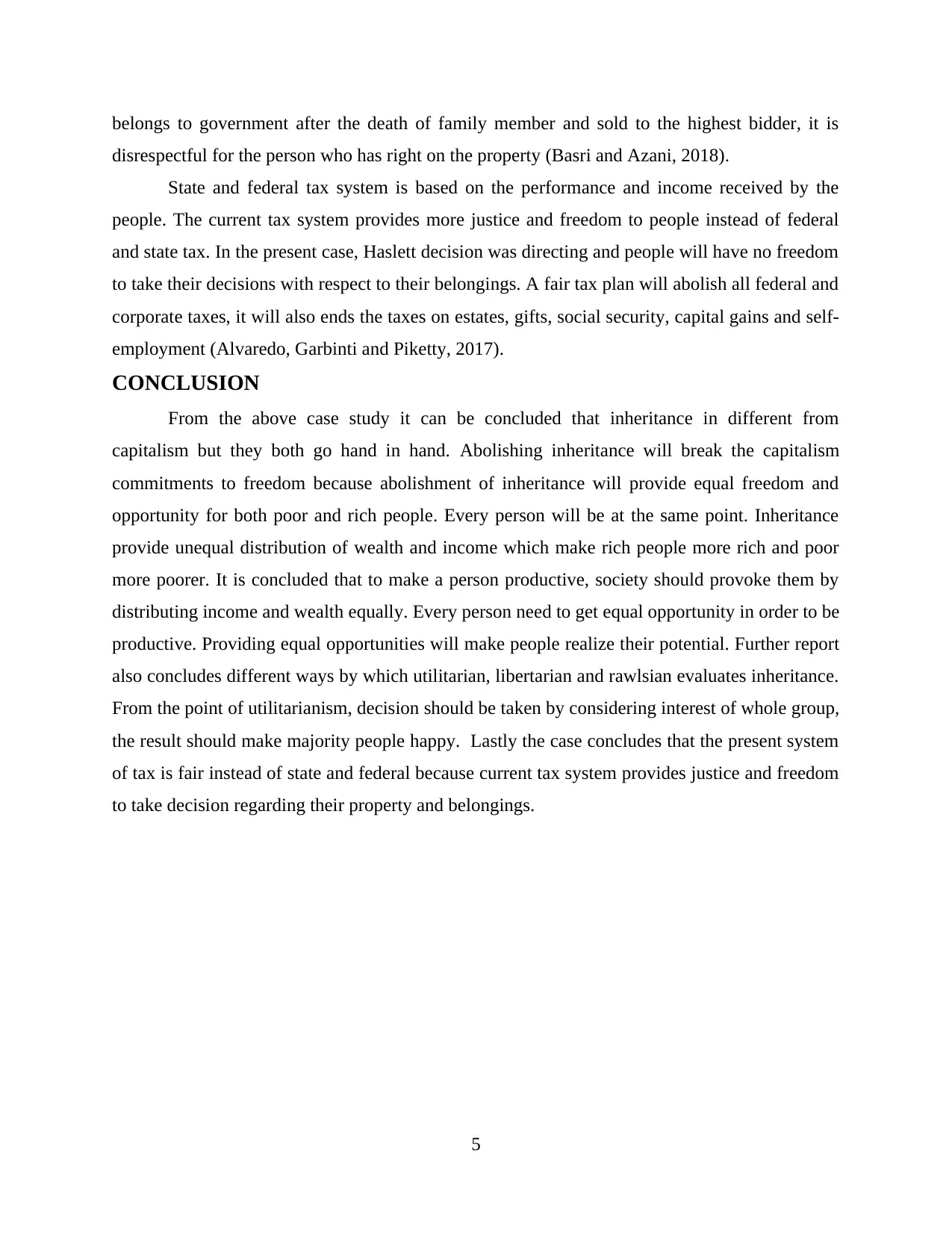
belongs to government after the death of family member and sold to the highest bidder, it is
disrespectful for the person who has right on the property (Basri and Azani, 2018).
State and federal tax system is based on the performance and income received by the
people. The current tax system provides more justice and freedom to people instead of federal
and state tax. In the present case, Haslett decision was directing and people will have no freedom
to take their decisions with respect to their belongings. A fair tax plan will abolish all federal and
corporate taxes, it will also ends the taxes on estates, gifts, social security, capital gains and self-
employment (Alvaredo, Garbinti and Piketty, 2017).
CONCLUSION
From the above case study it can be concluded that inheritance in different from
capitalism but they both go hand in hand. Abolishing inheritance will break the capitalism
commitments to freedom because abolishment of inheritance will provide equal freedom and
opportunity for both poor and rich people. Every person will be at the same point. Inheritance
provide unequal distribution of wealth and income which make rich people more rich and poor
more poorer. It is concluded that to make a person productive, society should provoke them by
distributing income and wealth equally. Every person need to get equal opportunity in order to be
productive. Providing equal opportunities will make people realize their potential. Further report
also concludes different ways by which utilitarian, libertarian and rawlsian evaluates inheritance.
From the point of utilitarianism, decision should be taken by considering interest of whole group,
the result should make majority people happy. Lastly the case concludes that the present system
of tax is fair instead of state and federal because current tax system provides justice and freedom
to take decision regarding their property and belongings.
5
disrespectful for the person who has right on the property (Basri and Azani, 2018).
State and federal tax system is based on the performance and income received by the
people. The current tax system provides more justice and freedom to people instead of federal
and state tax. In the present case, Haslett decision was directing and people will have no freedom
to take their decisions with respect to their belongings. A fair tax plan will abolish all federal and
corporate taxes, it will also ends the taxes on estates, gifts, social security, capital gains and self-
employment (Alvaredo, Garbinti and Piketty, 2017).
CONCLUSION
From the above case study it can be concluded that inheritance in different from
capitalism but they both go hand in hand. Abolishing inheritance will break the capitalism
commitments to freedom because abolishment of inheritance will provide equal freedom and
opportunity for both poor and rich people. Every person will be at the same point. Inheritance
provide unequal distribution of wealth and income which make rich people more rich and poor
more poorer. It is concluded that to make a person productive, society should provoke them by
distributing income and wealth equally. Every person need to get equal opportunity in order to be
productive. Providing equal opportunities will make people realize their potential. Further report
also concludes different ways by which utilitarian, libertarian and rawlsian evaluates inheritance.
From the point of utilitarianism, decision should be taken by considering interest of whole group,
the result should make majority people happy. Lastly the case concludes that the present system
of tax is fair instead of state and federal because current tax system provides justice and freedom
to take decision regarding their property and belongings.
5
Paraphrase This Document
Need a fresh take? Get an instant paraphrase of this document with our AI Paraphraser
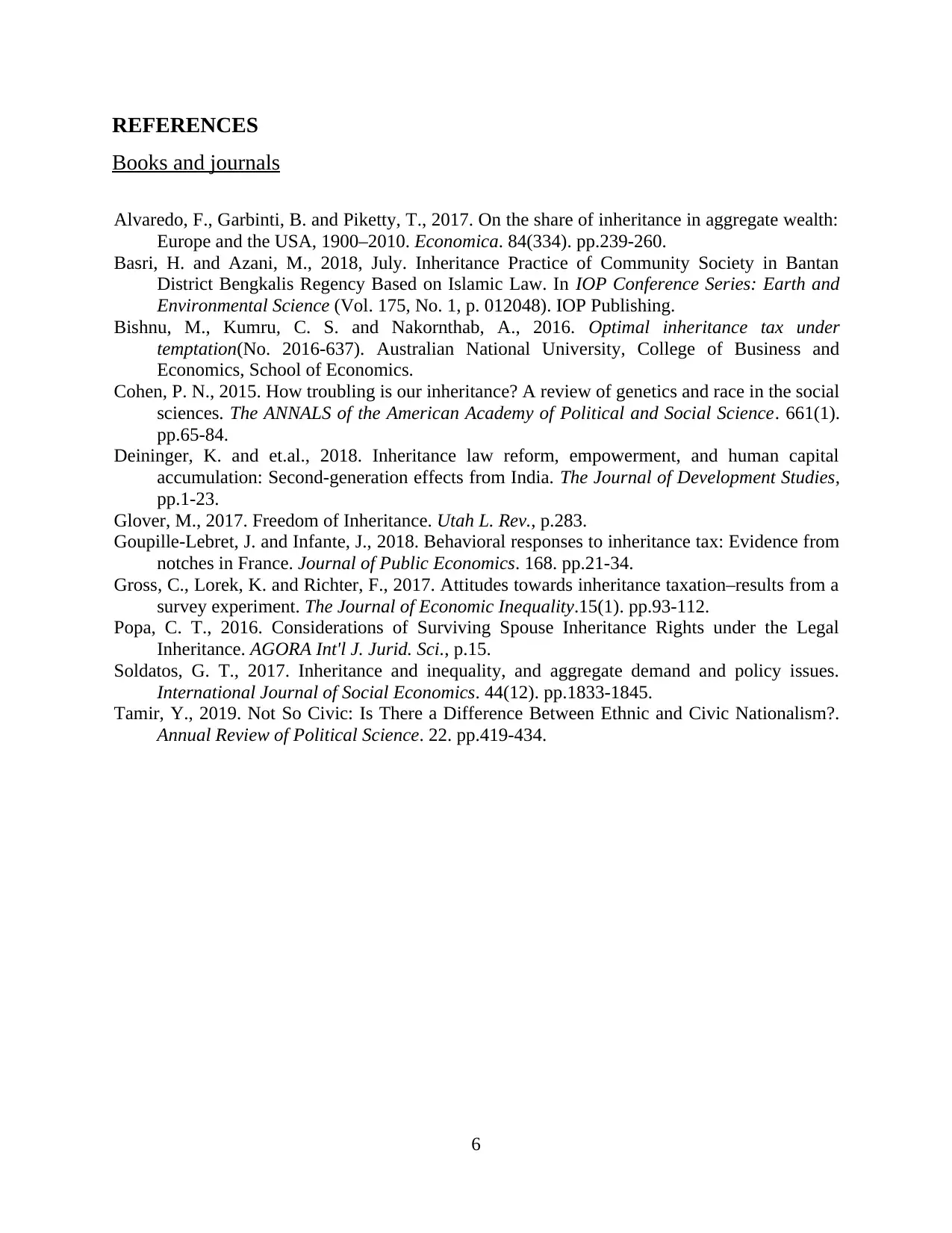
REFERENCES
Books and journals
Alvaredo, F., Garbinti, B. and Piketty, T., 2017. On the share of inheritance in aggregate wealth:
Europe and the USA, 1900–2010. Economica. 84(334). pp.239-260.
Basri, H. and Azani, M., 2018, July. Inheritance Practice of Community Society in Bantan
District Bengkalis Regency Based on Islamic Law. In IOP Conference Series: Earth and
Environmental Science (Vol. 175, No. 1, p. 012048). IOP Publishing.
Bishnu, M., Kumru, C. S. and Nakornthab, A., 2016. Optimal inheritance tax under
temptation(No. 2016-637). Australian National University, College of Business and
Economics, School of Economics.
Cohen, P. N., 2015. How troubling is our inheritance? A review of genetics and race in the social
sciences. The ANNALS of the American Academy of Political and Social Science. 661(1).
pp.65-84.
Deininger, K. and et.al., 2018. Inheritance law reform, empowerment, and human capital
accumulation: Second-generation effects from India. The Journal of Development Studies,
pp.1-23.
Glover, M., 2017. Freedom of Inheritance. Utah L. Rev., p.283.
Goupille-Lebret, J. and Infante, J., 2018. Behavioral responses to inheritance tax: Evidence from
notches in France. Journal of Public Economics. 168. pp.21-34.
Gross, C., Lorek, K. and Richter, F., 2017. Attitudes towards inheritance taxation–results from a
survey experiment. The Journal of Economic Inequality.15(1). pp.93-112.
Popa, C. T., 2016. Considerations of Surviving Spouse Inheritance Rights under the Legal
Inheritance. AGORA Int'l J. Jurid. Sci., p.15.
Soldatos, G. T., 2017. Inheritance and inequality, and aggregate demand and policy issues.
International Journal of Social Economics. 44(12). pp.1833-1845.
Tamir, Y., 2019. Not So Civic: Is There a Difference Between Ethnic and Civic Nationalism?.
Annual Review of Political Science. 22. pp.419-434.
6
Books and journals
Alvaredo, F., Garbinti, B. and Piketty, T., 2017. On the share of inheritance in aggregate wealth:
Europe and the USA, 1900–2010. Economica. 84(334). pp.239-260.
Basri, H. and Azani, M., 2018, July. Inheritance Practice of Community Society in Bantan
District Bengkalis Regency Based on Islamic Law. In IOP Conference Series: Earth and
Environmental Science (Vol. 175, No. 1, p. 012048). IOP Publishing.
Bishnu, M., Kumru, C. S. and Nakornthab, A., 2016. Optimal inheritance tax under
temptation(No. 2016-637). Australian National University, College of Business and
Economics, School of Economics.
Cohen, P. N., 2015. How troubling is our inheritance? A review of genetics and race in the social
sciences. The ANNALS of the American Academy of Political and Social Science. 661(1).
pp.65-84.
Deininger, K. and et.al., 2018. Inheritance law reform, empowerment, and human capital
accumulation: Second-generation effects from India. The Journal of Development Studies,
pp.1-23.
Glover, M., 2017. Freedom of Inheritance. Utah L. Rev., p.283.
Goupille-Lebret, J. and Infante, J., 2018. Behavioral responses to inheritance tax: Evidence from
notches in France. Journal of Public Economics. 168. pp.21-34.
Gross, C., Lorek, K. and Richter, F., 2017. Attitudes towards inheritance taxation–results from a
survey experiment. The Journal of Economic Inequality.15(1). pp.93-112.
Popa, C. T., 2016. Considerations of Surviving Spouse Inheritance Rights under the Legal
Inheritance. AGORA Int'l J. Jurid. Sci., p.15.
Soldatos, G. T., 2017. Inheritance and inequality, and aggregate demand and policy issues.
International Journal of Social Economics. 44(12). pp.1833-1845.
Tamir, Y., 2019. Not So Civic: Is There a Difference Between Ethnic and Civic Nationalism?.
Annual Review of Political Science. 22. pp.419-434.
6
1 out of 8
Related Documents
Your All-in-One AI-Powered Toolkit for Academic Success.
+13062052269
info@desklib.com
Available 24*7 on WhatsApp / Email
![[object Object]](/_next/static/media/star-bottom.7253800d.svg)
Unlock your academic potential
Copyright © 2020–2026 A2Z Services. All Rights Reserved. Developed and managed by ZUCOL.



